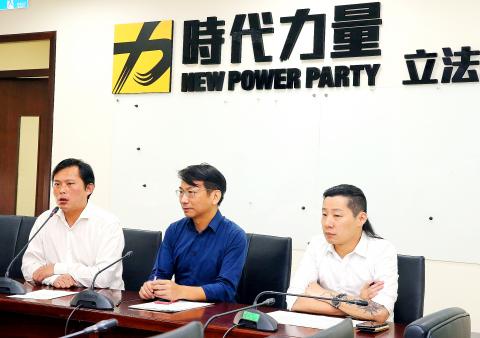The New Power Party (NPP) yesterday said it would push for amendments to the Referendum Act (公民投票法) to allow the public to vote on changing the Constitution and national territory, which it said are “the most important issues the public should be able to decide in a direct democracy.”
With the new legislative session set to begin on Friday, the NPP said that its priorities include amending the Referendum Act and the Act Governing Relations Between the People of the Taiwan Area and the Mainland Area (臺灣地區與大陸地區人民關係條例).
The party had proposed the same amendments in December last year, but they were vetoed by the Democratic Progressive Party (DPP) and the Chinese Nationalist Party (KMT).

Photo: CNA
Asked to comment on the DPP’s previous response, NPP Executive Chairman Huang Kuo-chang (黃國昌) said: “Why was the DPP brave enough to call for a referendum that would turn Taiwan into a normal nation when it was an opposition party, but abandoned the idea when it became the ruling party? By refusing to back the amendments, it ignored the most important issues people should be able to decide in a direct democracy, what the Referendum Act still owes the people.”
Whether people should be allowed to vote on the Constitution and national territory has been a subject of debate for more than 20 years, he said, adding that he hopes the DPP “would not make the same mistake again.”
The NPP will also promote amendments to the Act Governing Relations Between the People of the Taiwan Area and the Mainland Area that would strip Chinese residency cardholders of their household registration in Taiwan, NPP caucus whip Hsu Yung-ming (徐永明) said.
With more than 20,000 Taiwanese reportedly having applied for the card, the NPP would propose that they be allowed to keep their household registration if they cancel their card within a certain period, he said, adding that is likely to be two months.
Asked if the party would back a KMT proposal to abolish the Act on Promoting Transitional Justice (促進轉型正義條例) following a scandal involving the Transitional Justice Commission last week, Hsu said the party would oppose it, but that it supports a personnel reshuffle at the commission and the promotion of a lustration law.
Commission Chairman Huang Huang-hsiung (黃煌雄) is “incompetent” and must be removed from his position, Huang Kuo-chang said.
Instead of thinking about what he could have done better, he simply said he has not had time to read internal documents, Huang Kuo-chang said.
When asked about the scandal, Huang Huang-hsiung on Monday said that he had not had a chance to read most of the official documents until the middle of July and that it was not until last month that work finally got on track at the commission, which was founded in May.
Chang Tien-chin (張天欽) resigned on Wednesday last week as commission deputy chairman after the Chinese-language Mirror Media magazine published a transcript of a commission meeting on Aug. 24, in which he proposed promoting a lustration law to influence public opinion about KMT New Taipei City mayoral candidate Hou You-yi (侯友宜).

MAKING WAVES: China’s maritime militia could become a nontraditional threat in war, clogging up shipping lanes to prevent US or Japanese intervention, a report said About 1,900 Chinese ships flying flags of convenience and fishing vessels that participated in China’s military exercises around Taiwan last month and in January last year have been listed for monitoring, Coast Guard Administration (CGA) Deputy Director-General Hsieh Ching-chin (謝慶欽) said yesterday. Following amendments to the Commercial Port Act (商港法) and the Law of Ships (船舶法) last month, the CGA can designate possible berthing areas or deny ports of call for vessels suspected of loitering around areas where undersea cables can be accessed, Oceans Affairs Council Minister Kuan Bi-ling (管碧玲) said. The list of suspected ships, originally 300, had risen to about

DAREDEVIL: Honnold said it had always been a dream of his to climb Taipei 101, while a Netflix producer said the skyscraper was ‘a real icon of this country’ US climber Alex Honnold yesterday took on Taiwan’s tallest building, becoming the first person to scale Taipei 101 without a rope, harness or safety net. Hundreds of spectators gathered at the base of the 101-story skyscraper to watch Honnold, 40, embark on his daredevil feat, which was also broadcast live on Netflix. Dressed in a red T-shirt and yellow custom-made climbing shoes, Honnold swiftly moved up the southeast face of the glass and steel building. At one point, he stepped onto a platform midway up to wave down at fans and onlookers who were taking photos. People watching from inside

Japan’s strategic alliance with the US would collapse if Tokyo were to turn away from a conflict in Taiwan, Japanese Prime Minister Sanae Takaichi said yesterday, but distanced herself from previous comments that suggested a possible military response in such an event. Takaichi expressed her latest views on a nationally broadcast TV program late on Monday, where an opposition party leader criticized her for igniting tensions with China with the earlier remarks. Ties between Japan and China have sunk to the worst level in years after Takaichi said in November that a hypothetical Chinese attack on Taiwan could bring about a Japanese

STREAMLINED: The dedicated funding would allow the US to transfer equipment to Taiwan when needed and order upgraded replacements for stockpiles, a source said The US House of Representatives on Thursday passed a defense appropriations bill totaling US$838.7 billion, of which US$1 billion is to be allocated to reinforcing security cooperation with Taiwan and US$150 million to replace defense articles provided to the nation. These are part of the Consolidated Appropriation Act, which the US House yesterday passed with 341 votes in favor and 88 against. The act must be passed by the US Senate before Friday next week to avoid another government shutdown. The US House Committee on Appropriations on Monday unveiled the act, saying that it allocates US$1 billion for the Taiwan Security Cooperation Initiative